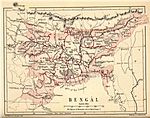Khadga dynasty
Appearance
Khadga dynasty | |
|---|---|
| 660 CE–750 CE | |
| Capital | Karmanta Vasaka in present-day Barakamata, Comilla district |
| Religion | Buddhism[1] |
| Government | Monarchy |
| Raja | |
• 625–640 | Khadgodyama (first) |
• 716–? | Udirnakhadga (last) |
| Historical era | Classical period |
• Established | 660 CE |
• Disestablished | 750 CE |
| Today part of | Bangladesh India |
| History of Bengal |
|---|
 |
The Khadga dynasty (Bengali: খড়্গ বংশ) was a Buddhist dynasty which ruled the areas of Vanga and Samatata in Bengal from 660 CE to 750 CE.[2] Chronologically, the dynasty emerged as a powerful kingdom between the fall of Gauda Kingdom and the rise of the Pala Empire. Their ascendancy may have been immediately preceded by the overthrow of a previously ruling Bhadra dynasty.[3] While they did not assume imperial titles, the Khadgas retained sovereignty over the ancient kingdom of Vanga and later conquered Samatata.[4] It was succeeded by the Deva dynasty.[5]
List of rulers
[edit]| Titular Name | Reign | Notes |
|---|---|---|
| Khadgodyama (খড়্গোদ্যম) | 625–640 | Father of Jatakhadga |
| Jatakhadga (জাতখড়্গ) | 640–658 | Father of Devakhadga |
| Devakhadga (দেবখড়্গ) | 658–673 | Queen Prabhavati (প্রভাবতী) |
| Rajabhatta (রাজভট্ট) | 673–707 | Son of Devakhadga |
| Balabhatta (বলভট্ট) | 707–716 | Son of Devakhadga |
| Udirnakhadga (উদীর্ণখড়্গ) | ?? |
References
[edit]- ^ "Khaḍga dynasty". Oxford Dictionary of Buddhism. 2004.
- ^ Sailendra Nath Sen (1 January 1999). Ancient Indian History And Civilization. New Age International. p. 277. ISBN 978-81-224-1198-0. Retrieved 18 April 2012.
- ^ Bari, Latiful, ed. (1979). Bangladesh District Gazetteers: Jessore. Bangladesh Government Press. p. 39.
- ^ Ray, Krishnendu (2012). "Khadga Dynasty". In Sirajul Islam; Miah, Sajahan; Khanam, Mahfuza; Ahmed, Sabbir (eds.). Banglapedia: the National Encyclopedia of Bangladesh (Online ed.). Dhaka, Bangladesh: Banglapedia Trust, Asiatic Society of Bangladesh. ISBN 984-32-0576-6. OCLC 52727562. OL 30677644M. Retrieved 22 December 2024.
- ^ Singer, Noel F. (2008). Vaishali and the Indianization of Arakan. New Delhi: APH Publishing Corp. ISBN 978-81-313-0405-1. OCLC 244247519.
